Question
USE THE REFERENCE Issue: What overarching issue was the court addressing or resolving (one questions not a paragraph just one sentence encapsulating) Facts: What are


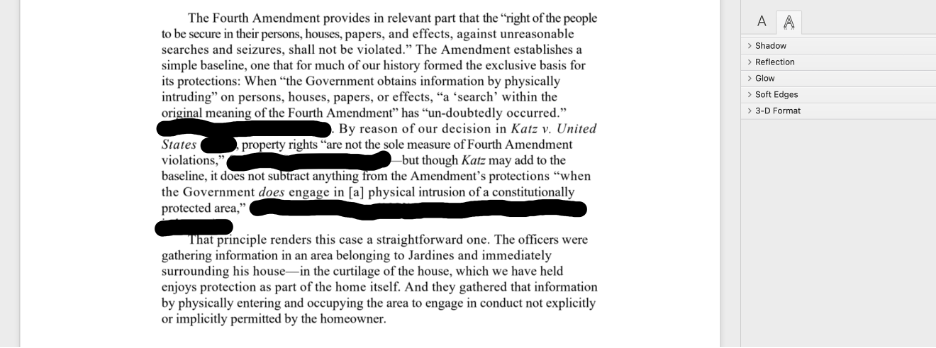
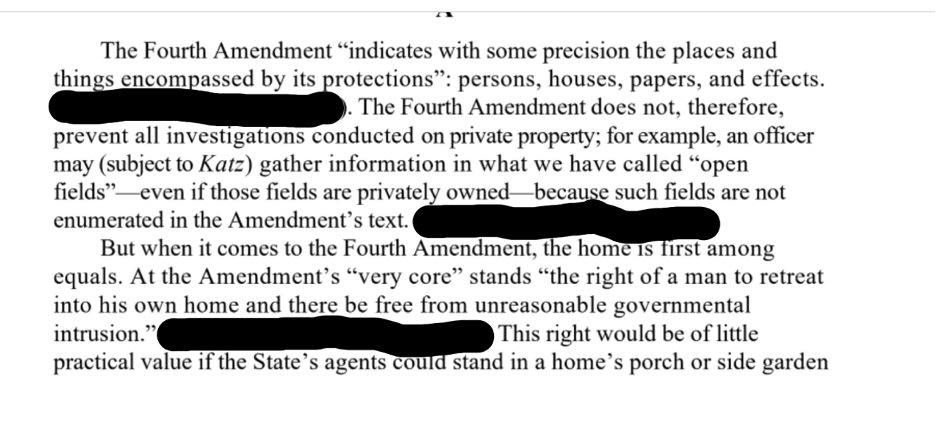
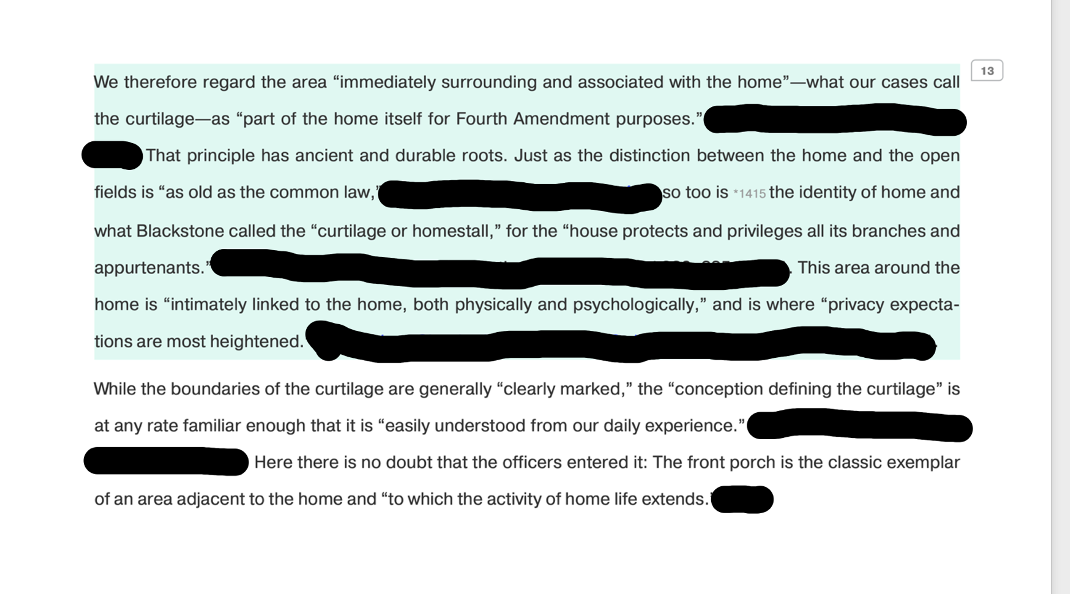
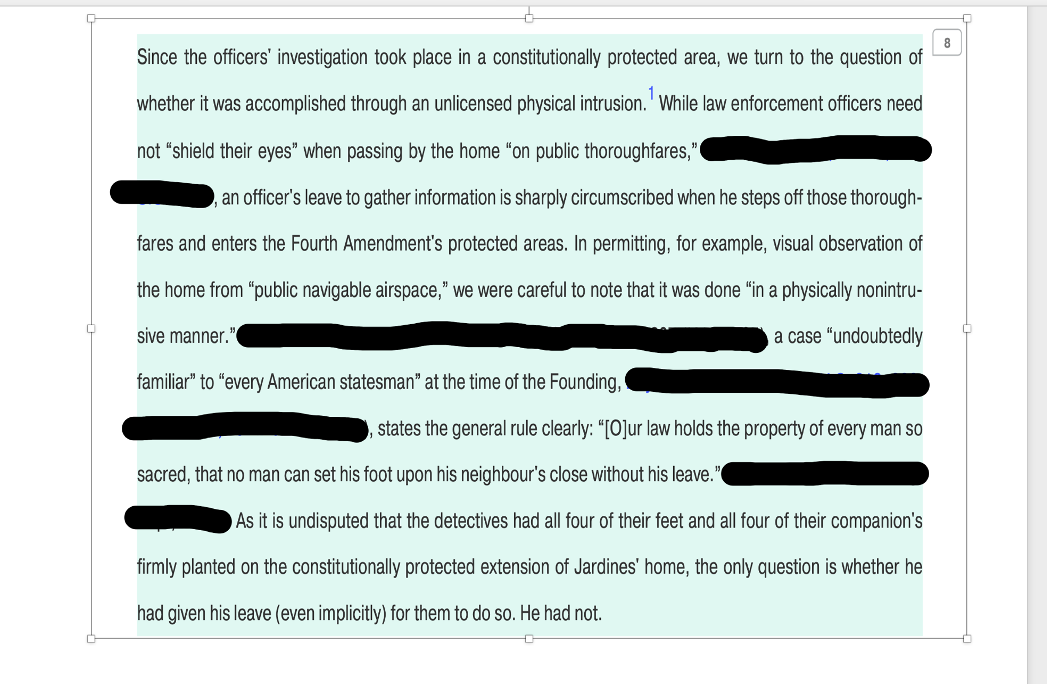
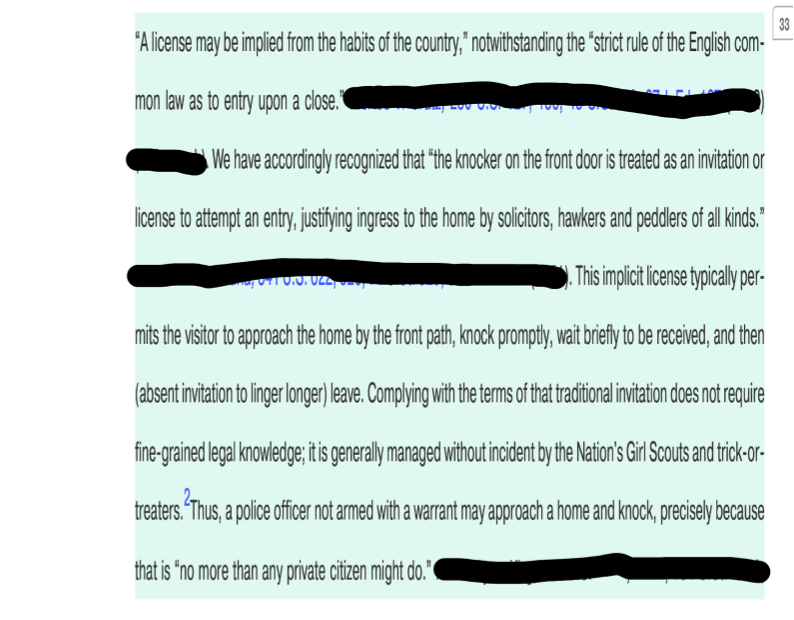
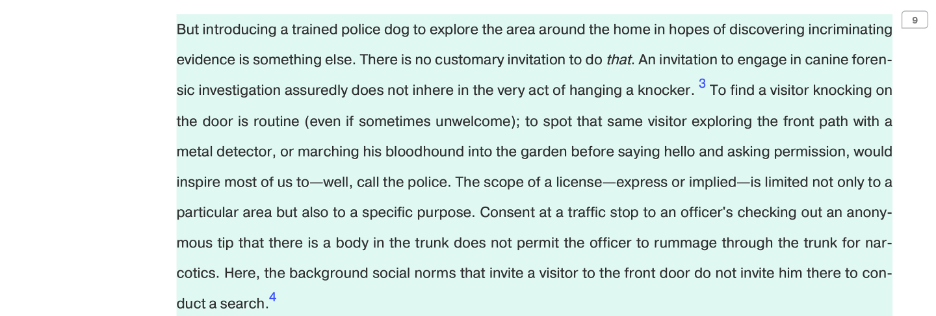
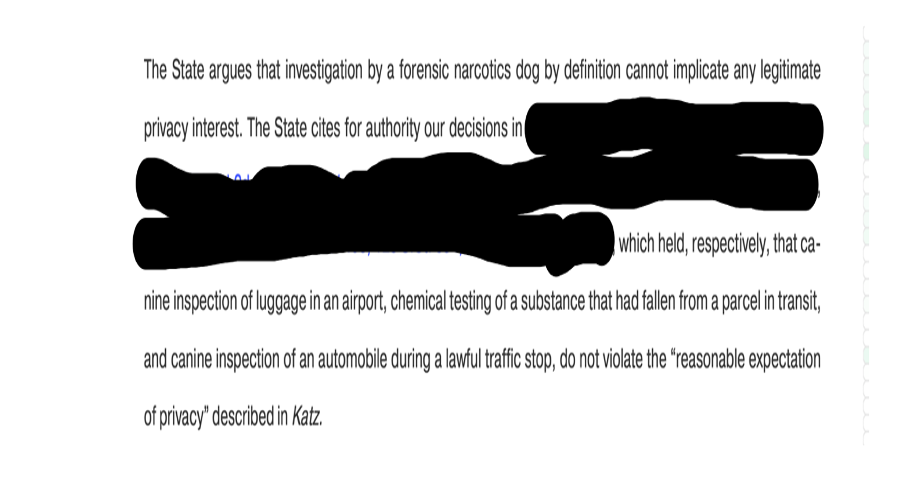
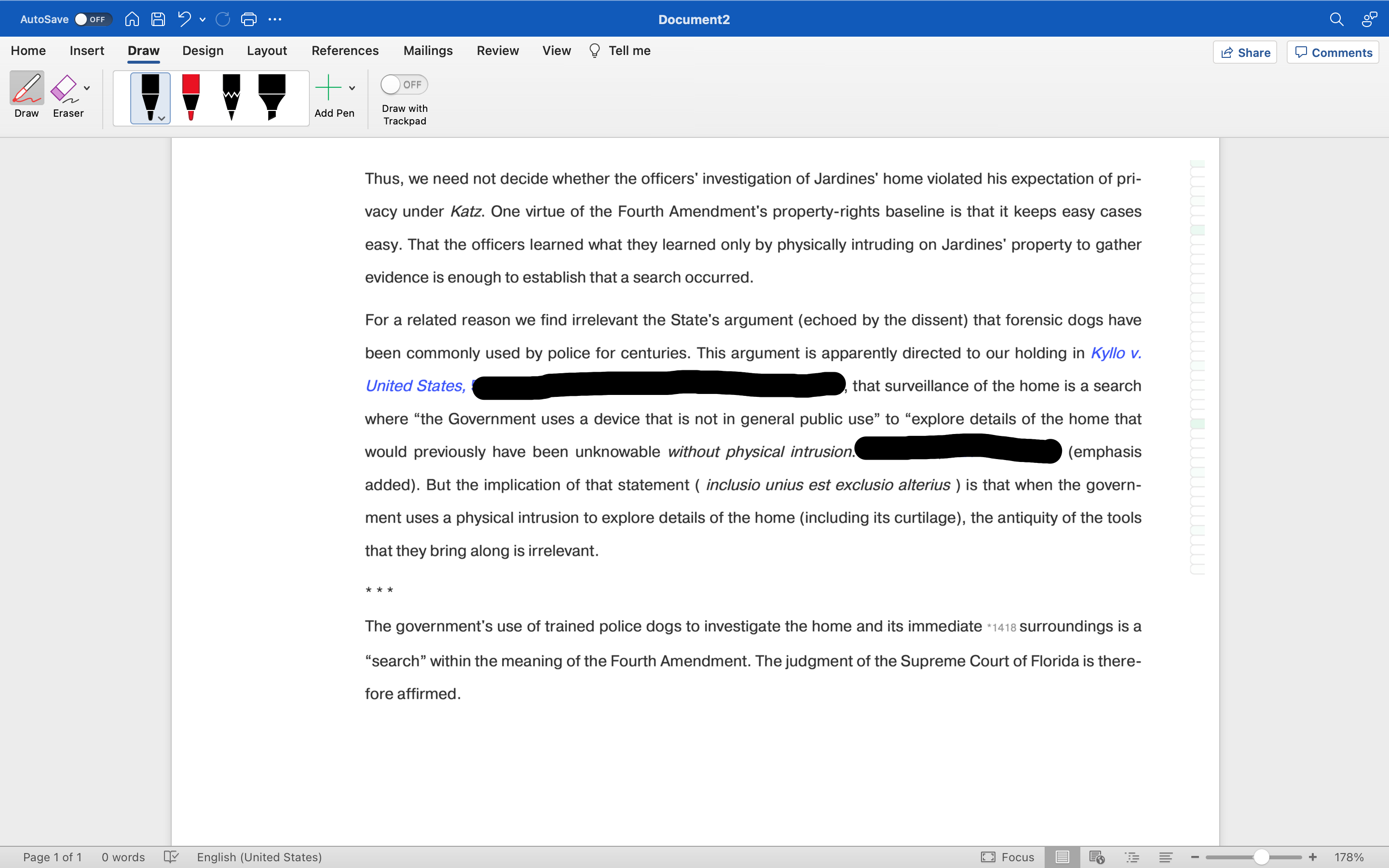
USE THE REFERENCE
Issue: What overarching issue was the court addressing or resolving (one questions not a paragraph just one sentence encapsulating)
Facts: What are the facts that the court described and cared about?
facts section should only include the actual facts of the case.
Rule of Law:What rule please mention the statue, case, legal principle mentioned in the images, did the court apply
*rule of law segment should only include the actual statutes, constitutional amendments or cases the Court applies the facts
Application- how did the court apply the rule to the facts?
*application section should be how the Court applied the facts to the law
Conclusion: what result did the court reach and WHY?
Florida v. Jardines
Jardines' home was searched, marijuana plants were discovered, and he was charged with trafficking. At trial, Jardines moved to suppress the marjuana plants on the ground that the canine investigation conducted on his front porch was an unreasonable search, rendering the searchw arrant obtained on the basis of the dog's positive alert invalid.
But when it comes to the Fourth Amendment, the home is first among equals,". "At the amendment's very core stands the right of a man to retreat into his own home and there be free from unreasonable government intrusion." That right would be "of little practical value if the state's agents could stand in a home's porch or side garden and trawl for evidence with impunity," the right to retreat would be significantly diminished if the right to retreat would be significantly diminished if the police could enter a man's property to observe his repose form just outside the front window.


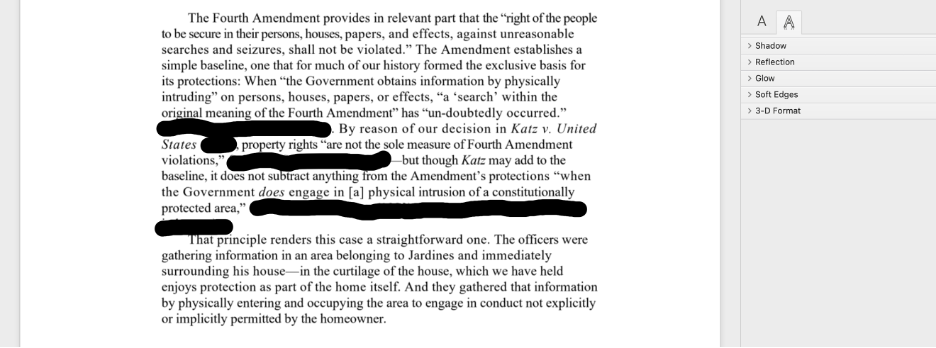
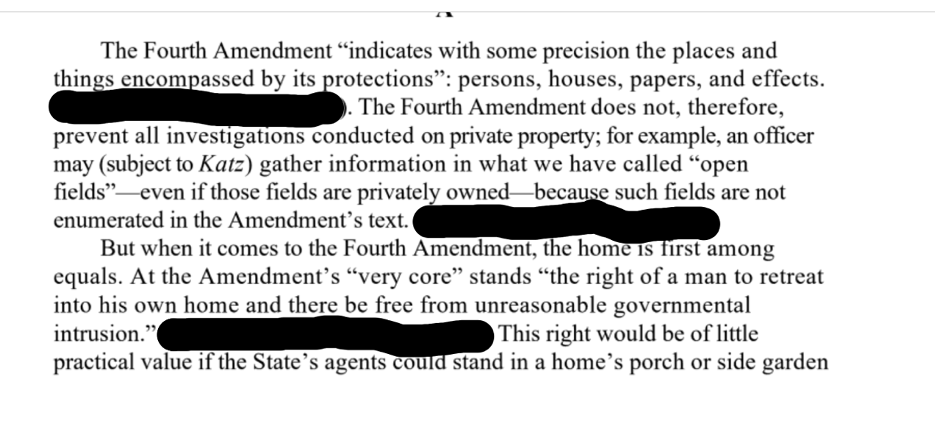
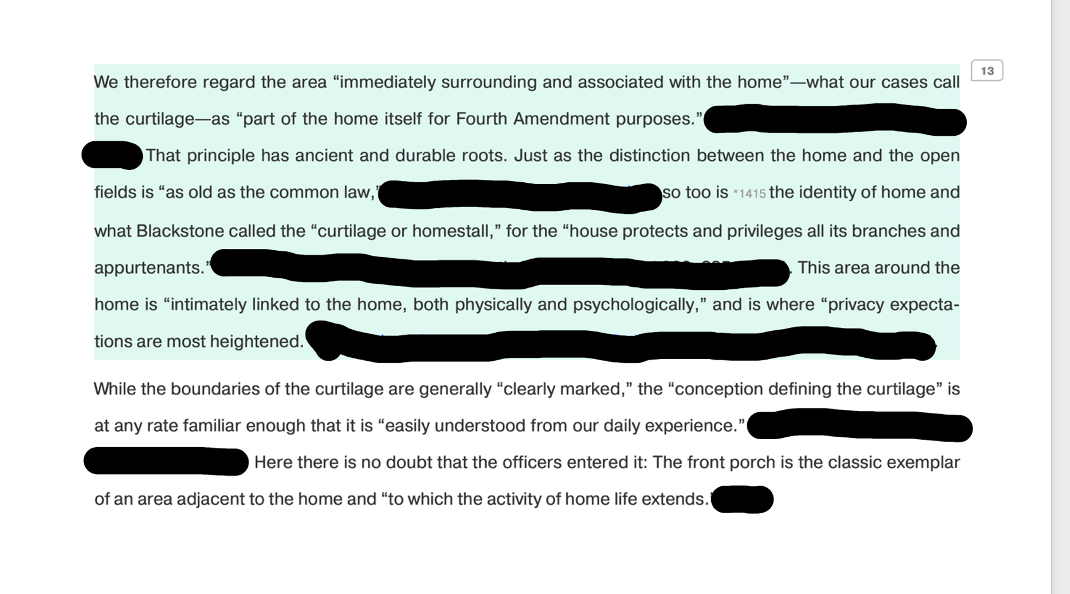
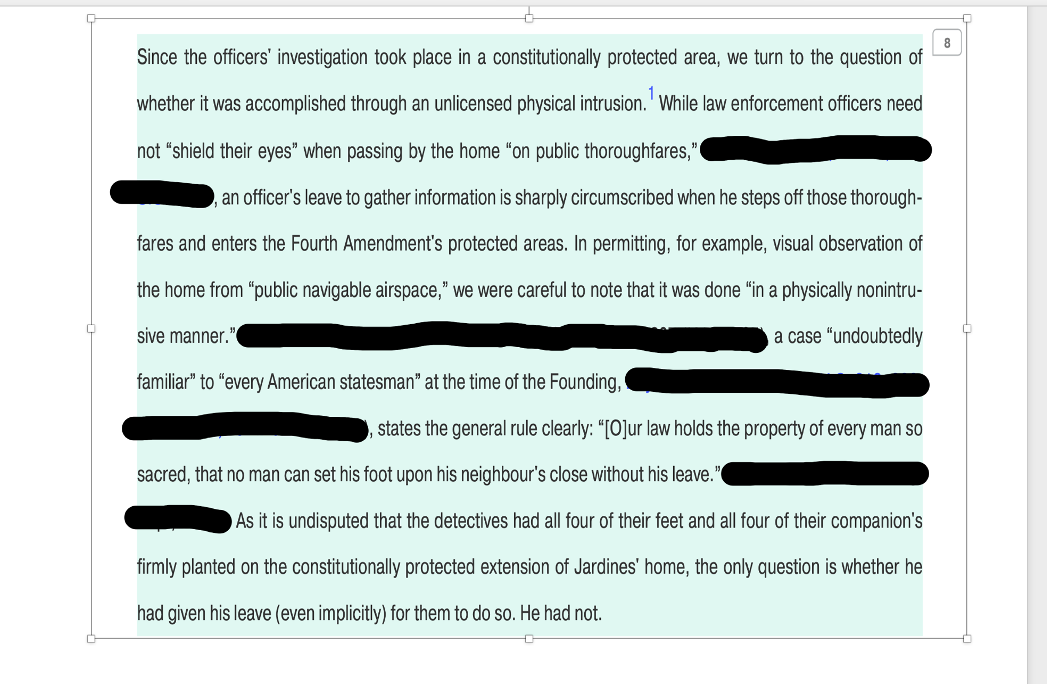
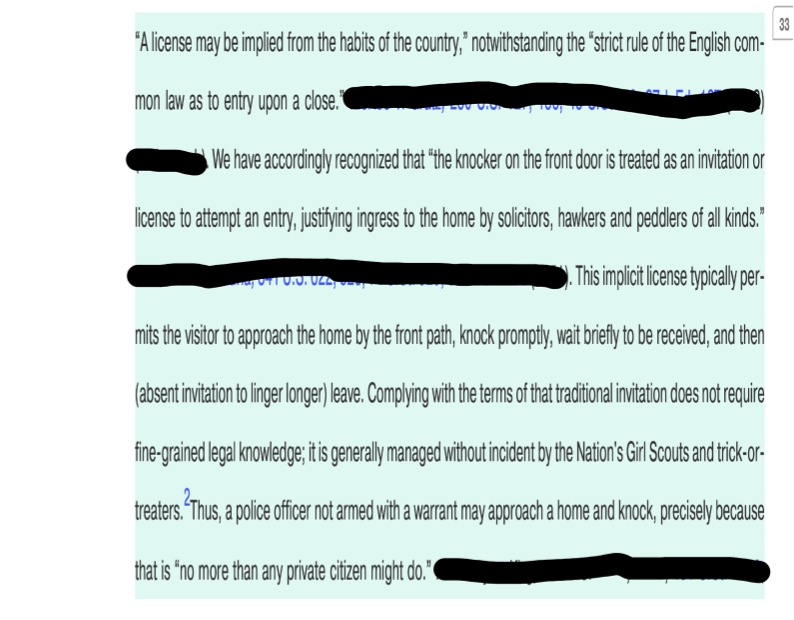
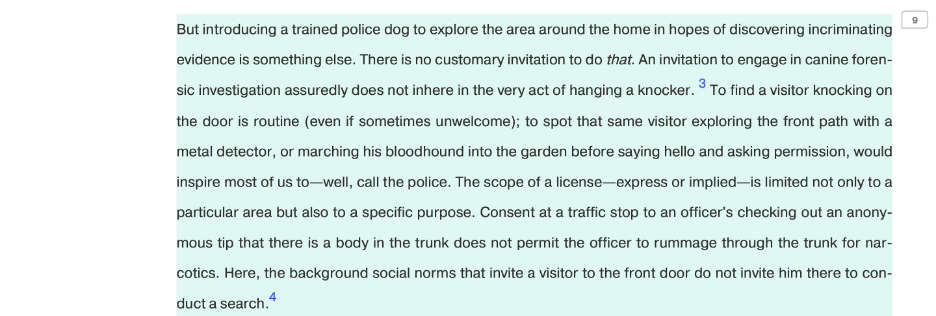
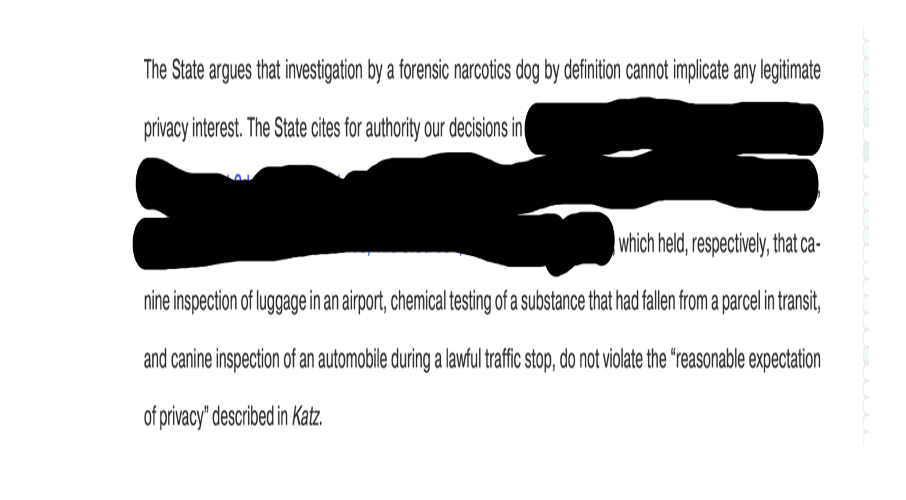
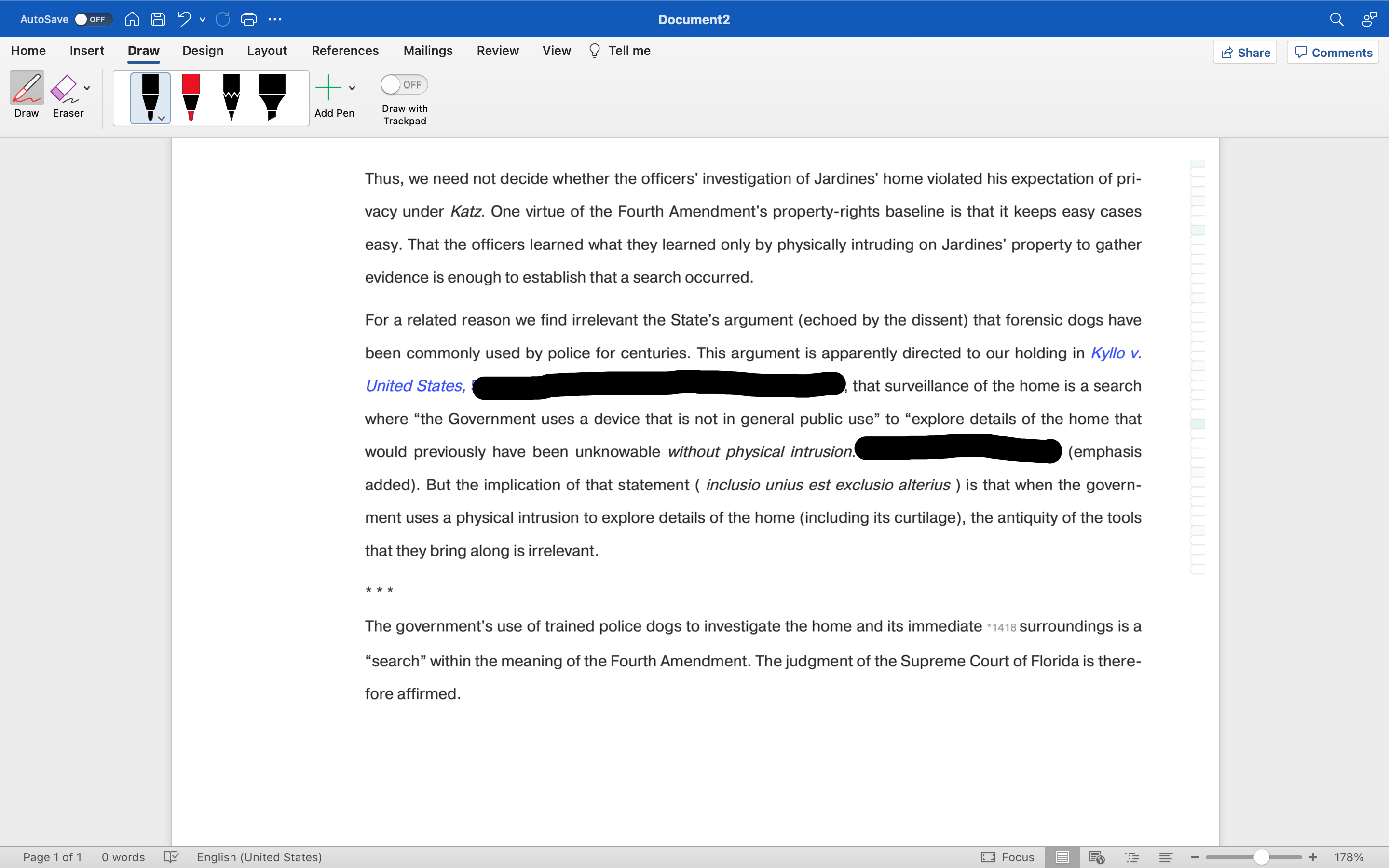 Result 1 of 1 in this book for A police detective, acting on an unverified tip that marijuana was being grown in Jardines' home, employed a drug-sniffing dog on his front porch to sniff his front door. The dog's Clear search positive alert was used to obtain a search warrant.JUSTICE SCALIA delivered the opinion of the Court. We consider whether using a drug-sniffing dog on a homeowner's porch to inves- tigate the contents of the home is a "search" within the meaning of the Fourth Amendment.The Fourth Amendment provides in relevant part that the "right of the people A A to be secure in their persons, houses, papers, and effects, against unreasonable searches and seizures, shall not be violated." The Amendment establishes a > Shadow simple baseline, one that for much of our history formed the exclusive basis for > Reflection its protections: When "the Government obtains information by physically > Glow intruding" on persons, houses, papers, or effects, "a 'search' within the 3 Soft Edges original meaning of the Fourth Amendment" has "un-doubtedly occurred." > 3-D Format By reason of our decision in Katz v. United States property rights "are not the sole measure of Fourth Amendment violations," but though Katz may add to the baseline, it does not subtract anything from the Amendment's protections "when the Government does engage in [a] physical intrusion of a constitutionally protected area," That principle renders this case a straightforward one. The officers were gathering information in an area belonging to Jardines and immediately surrounding his house-in the curtilage of the house, which we have held enjoys protection as part of the home itself. And they gathered that information by physically entering and occupying the area to engage in conduct not explicitly or implicitly permitted by the homeowner.The Fourth Amendment "indicates with some precision the places and things encompassed by its protections": persons, houses, papers, and effects. The Fourth Amendment does not, therefore, prevent all investigations conducted on private property; for example, an officer may (subject to Katz) gather information in what we have called "open fields"-even if those fields are privately owned-because such fields are not enumerated in the Amendment's text. But when it comes to the Fourth Amendment, the home is first among equals. At the Amendment's "very core" stands "the right of a man to retreat into his own home and there be free from unreasonable governmental intrusion." This right would be of little practical value if the State's agents could stand in a home's porch or side gardenWe therefore regard the area \"immediately surrounding and associated with the home\"what our cases call m the curtilageas "part at the home itself for Fourth Amendment purposes.\" -That principle has ancient and durable roots. Just as the distinction between the home and the open fields is \"as old as the common law.'so too is 'msthe identity of home and what Blackstone called the \"curtilage or homestell,\" for the \"house protects and privileges all its branches and appurtenants.' This area around the home is \"intimately linked to the home. both physically and psychologically." and is where \"privacy expecta- tions are most he ightened._ While the boundaries of the curtilage are generally \"clearly marked." the "conception defining the curtilage" is at any rate familiar enough that it is \"easily understood from our daily' experience.\" Here there is no doubt that the officers entered it: The front porch is the classic exemplar of an area adjacent to the home and "to which the activity of home life extends.- { Since the ofcers' investigation took place in a constitutionally protected area, we turn to the question of i' whether it was accomplished through an unlicensed physical intrusion.1 While law enforcement officers need not \"shield their eyes\" when passing by the home "on public thoroughfares." -, an ofcer's leave to gather information is sharply circumscribed when he steps off those thorough- fares and enters the Fourth Amendment's protected areas. In permitting, for example, visual observation of the home from "public navigable airspace.\" we were careful to note that it was done "in a physically nonintru- sive manner?\" a case "undoubtedly familiar\" to "every American statesman\" at the time of the Founding, _ , states the general rule clearly: \"[0]ur law holds the property of every man so sacred. that no man can set his foot upon his neighbour's close without his leave." As it is undisputed that the detectives had all four of their feet and all four of their companion's firmly planted on the constitutionally protected extension of Jardines' home, the only question is whether he had given his leave (even implicitly) for them to do so. He had not. _ L 33 "A license may be implied from the habits of the country, " notwithstanding the "strict rule of the English com- mon law as to entry upon a close. We have accordingly recognized that "the knocker on the front door is treated as an invitation or license to attempt an entry, justifying ingress to the home by solicitors, hawkers and peddlers of all kinds." This implicit license typically per- mits the visitor to approach the home by the front path, knock promptly, wait briefly to be received, and then (absent invitation to linger longer) leave. Complying with the terms of that traditional invitation does not require fine-grained legal knowledge; it is generally managed without incident by the Nation's Girl Scouts and trick-or- treaters."Thus, a police officer not armed with a warrant may approach a home and knock, precisely because that is " no more than any private citizen might do."But Introducing a trained police dog to explore the area around the home in hopes of discovering incriminating evidence is something else. There is no customary invitation to do that. An invitation to engage in canine foren sic Investigation assuredly does not inhere in the very act of hanging a knocker. a To fl nd a visitor knocking on the door is routine (even if sometimes unwelcome]: to spot that same \ lsltor exploring the front path Mth a metal detector, or marching his bloodhound into the garden before saying hello and asking permission. would inspire most of us towetl. call the police. The scope of a licenseexpress or impliedis limited not only to a particular area but also to a specic purpose. Consent at a trafc stop to an officers checking out an anony- mous tip that there is a. body in the trunk does not permit the officer to rummage through the trunk for nar~ cotica. Here. the background social norms that invite a visitor to the front door do not invite him there to con- duct 21 search.' The State argues that investigation by a forensic narcotics dog by definition cannot implicate any legitimate privacy interest. The State cites for authority our decisions in which held, respectively, that ca- nine inspection of luggage in an airport, chemical testing of a substance that had fallen from a parcel in transit, and canine inspection of an automobile during a lawful traffic stop, do not violate the "reasonable expectation of privacy" described in Katz.AutoSave OFF A A ? C G ... Document2 Home Insert Draw Design Layout References Mailings Review View ? Tell me Share Comments - v OFF Draw Eraser Add Pen Draw with Trackpad Thus, we need not decide whether the officers' investigation of Jardines' home violated his expectation of pri- vacy under Katz. One virtue of the Fourth Amendment's property-rights baseline is that it keeps easy cases easy. That the officers learned what they learned only by physically intruding on Jardines' property to gather evidence is enough to establish that a search occurred. For a related reason we find irrelevant the State's argument (echoed by the dissent) that forensic dogs have been commonly used by police for centuries. This argument is apparently directed to our holding in Kyllo v. United States, that surveillance of the home is a search where "the Government uses a device that is not in general public use" to "explore details of the home that would previously have been unknowable without physical intrusion. emphasis added). But the implication of that statement ( inclusionunius est exclusionalterius ) is that when the govern- ment uses a physical intrusion to explore details of the home (including its curtilage), the antiquity of the tools that they bring along is irrelevant. * * * The government's use of trained police dogs to investigate the home and its immediate *1418 surroundings is a "search" within the meaning of the Fourth Amendment. The judgment of the Supreme Court of Florida is there- fore affirmed. Page 1 of 1 0 words English (United States) Focus E + 178%
Result 1 of 1 in this book for A police detective, acting on an unverified tip that marijuana was being grown in Jardines' home, employed a drug-sniffing dog on his front porch to sniff his front door. The dog's Clear search positive alert was used to obtain a search warrant.JUSTICE SCALIA delivered the opinion of the Court. We consider whether using a drug-sniffing dog on a homeowner's porch to inves- tigate the contents of the home is a "search" within the meaning of the Fourth Amendment.The Fourth Amendment provides in relevant part that the "right of the people A A to be secure in their persons, houses, papers, and effects, against unreasonable searches and seizures, shall not be violated." The Amendment establishes a > Shadow simple baseline, one that for much of our history formed the exclusive basis for > Reflection its protections: When "the Government obtains information by physically > Glow intruding" on persons, houses, papers, or effects, "a 'search' within the 3 Soft Edges original meaning of the Fourth Amendment" has "un-doubtedly occurred." > 3-D Format By reason of our decision in Katz v. United States property rights "are not the sole measure of Fourth Amendment violations," but though Katz may add to the baseline, it does not subtract anything from the Amendment's protections "when the Government does engage in [a] physical intrusion of a constitutionally protected area," That principle renders this case a straightforward one. The officers were gathering information in an area belonging to Jardines and immediately surrounding his house-in the curtilage of the house, which we have held enjoys protection as part of the home itself. And they gathered that information by physically entering and occupying the area to engage in conduct not explicitly or implicitly permitted by the homeowner.The Fourth Amendment "indicates with some precision the places and things encompassed by its protections": persons, houses, papers, and effects. The Fourth Amendment does not, therefore, prevent all investigations conducted on private property; for example, an officer may (subject to Katz) gather information in what we have called "open fields"-even if those fields are privately owned-because such fields are not enumerated in the Amendment's text. But when it comes to the Fourth Amendment, the home is first among equals. At the Amendment's "very core" stands "the right of a man to retreat into his own home and there be free from unreasonable governmental intrusion." This right would be of little practical value if the State's agents could stand in a home's porch or side gardenWe therefore regard the area \"immediately surrounding and associated with the home\"what our cases call m the curtilageas "part at the home itself for Fourth Amendment purposes.\" -That principle has ancient and durable roots. Just as the distinction between the home and the open fields is \"as old as the common law.'so too is 'msthe identity of home and what Blackstone called the \"curtilage or homestell,\" for the \"house protects and privileges all its branches and appurtenants.' This area around the home is \"intimately linked to the home. both physically and psychologically." and is where \"privacy expecta- tions are most he ightened._ While the boundaries of the curtilage are generally \"clearly marked." the "conception defining the curtilage" is at any rate familiar enough that it is \"easily understood from our daily' experience.\" Here there is no doubt that the officers entered it: The front porch is the classic exemplar of an area adjacent to the home and "to which the activity of home life extends.- { Since the ofcers' investigation took place in a constitutionally protected area, we turn to the question of i' whether it was accomplished through an unlicensed physical intrusion.1 While law enforcement officers need not \"shield their eyes\" when passing by the home "on public thoroughfares." -, an ofcer's leave to gather information is sharply circumscribed when he steps off those thorough- fares and enters the Fourth Amendment's protected areas. In permitting, for example, visual observation of the home from "public navigable airspace.\" we were careful to note that it was done "in a physically nonintru- sive manner?\" a case "undoubtedly familiar\" to "every American statesman\" at the time of the Founding, _ , states the general rule clearly: \"[0]ur law holds the property of every man so sacred. that no man can set his foot upon his neighbour's close without his leave." As it is undisputed that the detectives had all four of their feet and all four of their companion's firmly planted on the constitutionally protected extension of Jardines' home, the only question is whether he had given his leave (even implicitly) for them to do so. He had not. _ L 33 "A license may be implied from the habits of the country, " notwithstanding the "strict rule of the English com- mon law as to entry upon a close. We have accordingly recognized that "the knocker on the front door is treated as an invitation or license to attempt an entry, justifying ingress to the home by solicitors, hawkers and peddlers of all kinds." This implicit license typically per- mits the visitor to approach the home by the front path, knock promptly, wait briefly to be received, and then (absent invitation to linger longer) leave. Complying with the terms of that traditional invitation does not require fine-grained legal knowledge; it is generally managed without incident by the Nation's Girl Scouts and trick-or- treaters."Thus, a police officer not armed with a warrant may approach a home and knock, precisely because that is " no more than any private citizen might do."But Introducing a trained police dog to explore the area around the home in hopes of discovering incriminating evidence is something else. There is no customary invitation to do that. An invitation to engage in canine foren sic Investigation assuredly does not inhere in the very act of hanging a knocker. a To fl nd a visitor knocking on the door is routine (even if sometimes unwelcome]: to spot that same \ lsltor exploring the front path Mth a metal detector, or marching his bloodhound into the garden before saying hello and asking permission. would inspire most of us towetl. call the police. The scope of a licenseexpress or impliedis limited not only to a particular area but also to a specic purpose. Consent at a trafc stop to an officers checking out an anony- mous tip that there is a. body in the trunk does not permit the officer to rummage through the trunk for nar~ cotica. Here. the background social norms that invite a visitor to the front door do not invite him there to con- duct 21 search.' The State argues that investigation by a forensic narcotics dog by definition cannot implicate any legitimate privacy interest. The State cites for authority our decisions in which held, respectively, that ca- nine inspection of luggage in an airport, chemical testing of a substance that had fallen from a parcel in transit, and canine inspection of an automobile during a lawful traffic stop, do not violate the "reasonable expectation of privacy" described in Katz.AutoSave OFF A A ? C G ... Document2 Home Insert Draw Design Layout References Mailings Review View ? Tell me Share Comments - v OFF Draw Eraser Add Pen Draw with Trackpad Thus, we need not decide whether the officers' investigation of Jardines' home violated his expectation of pri- vacy under Katz. One virtue of the Fourth Amendment's property-rights baseline is that it keeps easy cases easy. That the officers learned what they learned only by physically intruding on Jardines' property to gather evidence is enough to establish that a search occurred. For a related reason we find irrelevant the State's argument (echoed by the dissent) that forensic dogs have been commonly used by police for centuries. This argument is apparently directed to our holding in Kyllo v. United States, that surveillance of the home is a search where "the Government uses a device that is not in general public use" to "explore details of the home that would previously have been unknowable without physical intrusion. emphasis added). But the implication of that statement ( inclusionunius est exclusionalterius ) is that when the govern- ment uses a physical intrusion to explore details of the home (including its curtilage), the antiquity of the tools that they bring along is irrelevant. * * * The government's use of trained police dogs to investigate the home and its immediate *1418 surroundings is a "search" within the meaning of the Fourth Amendment. The judgment of the Supreme Court of Florida is there- fore affirmed. Page 1 of 1 0 words English (United States) Focus E + 178% Step by Step Solution
There are 3 Steps involved in it
Step: 1

Get Instant Access to Expert-Tailored Solutions
See step-by-step solutions with expert insights and AI powered tools for academic success
Step: 2

Step: 3

Ace Your Homework with AI
Get the answers you need in no time with our AI-driven, step-by-step assistance
Get Started


